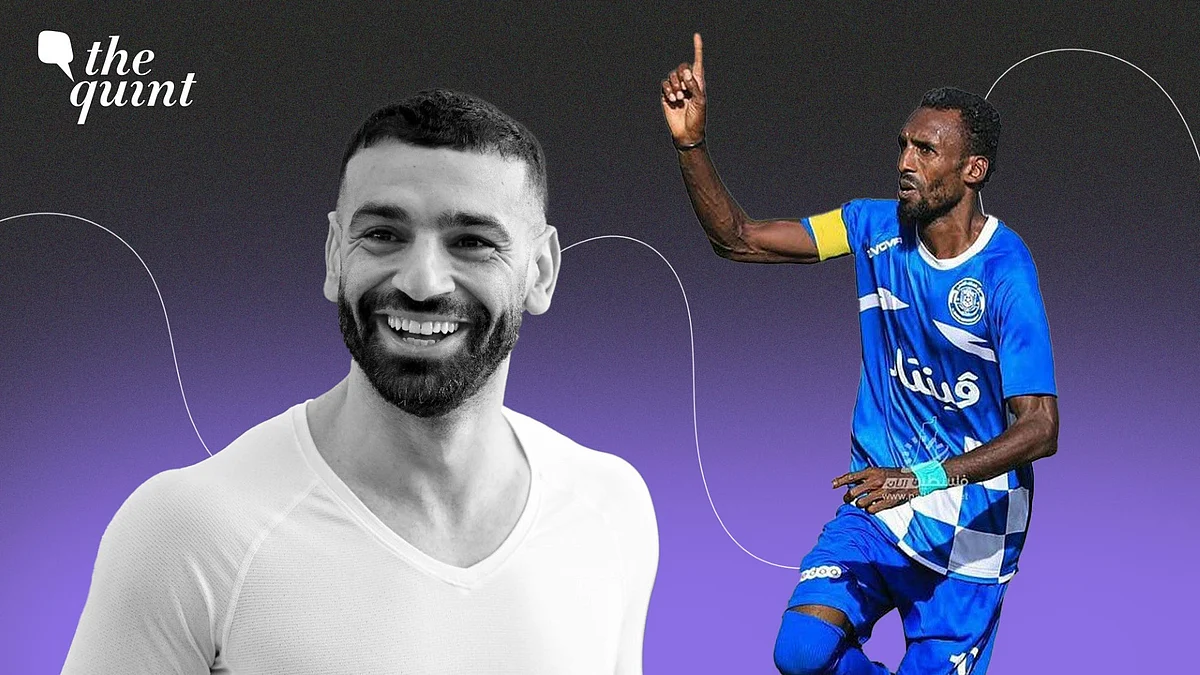No One Killed Palestinian Pele — Salah Ends Football's Defeaning Silence on Gaza
It took 662 athletes' death and a tweet from Mohamed Salah, but UEFA have finally preached non-violence in Palestine

advertisement
Something odd happened on 13 August at the UEFA Super Cup between Paris Saint-Germain and Tottenham Hotspur.
No, not that Spurs squandered a two-goal lead in the dying minutes. There are precedents aplenty for that. Enough to dust off Giorgio Chiellini’s famous “This is the history of the Tottenham” quip.
But, something odd happened even before a ball was kicked in Udine, Italy.
It’s a line that mirrors the long-standing stance of FIFA and UEFA.
Yet yesterday in Udine, something shifted. Before kick-off, two banners appeared: Stop Killing Children and Stop Killing Civilians.
Directed at whom? Israel? Hamas? The Association of Stray Dogs in India? Or, perhaps, the abortion clinics? Who needs to stop killing which children?
It would have been a deviation if UEFA were to explicitly call out what they have not so far. But yesterday, they did.
Alongside Tala was Mohamed — three years younger to her — who had lost both of his parents to an Israeli air strike.
UEFA issued a six-paragraph, 259-word press release. Not once did it mention the word Israel.
Still, it marked a departure. The governing body, for once, had acknowledged — however obliquely — the devastation in Gaza.
The Death of Palestinian Pele
Perhaps, the trigger was the event of 6 August. On that fateful day, Palestinian footballer Suleiman Al-Obeid lost his life tragically to an Israeli tank shell, while he has queued up to collect the week’s humanitarian aid. Al-Obeid was not the first footballer to have met this fate. Rather, he has the 321st member of Palestine’s footballing community — which is now nearly in a state of ruins — to have lost his life in the war.
Following his demise, the Palestinian Football Association painted a portrait of the national icon through its tribute.
There have not been 321 tweets of commiserations from UEFA or FIFA about the deaths of Palestinian footballers. But even at his death, Al-Obeid remained as unavoidable as he was in his life. Still playing at 41, and harbouring the dreams of not retiring until he was 50, Al-Obeid was affectionately called the ‘Palestinian Pele’ by his fans. His international career might only have a couple of goals, but his stature was not shy of legendary in his nation.
The nation that once existed, that is.
Mohamed Salah at the Backpost
Al-Obeid, the 321st victim of strikes, warranted a public note of commiseration. UEFA wrote:
This could have been the end of it — another quiet note in a long list of ignored tragedies — if not for Mohamed Salah. The Liverpool forward responded publicly:
Can you tell us how he died, where, and why?
662 Athletes Have Died. There Are No Killers.
Before Al-Obeid, there was Mohammed Barakat. Called the ‘Legend of Khan Younis,’ he was Palestine club football’s first-ever centurion. There was also Rashid Dabour. Nazir Atta Al-Nashash. Hani Al-Masdar. Names on a growing roll call: 321 footballers, 662 athletes in total, killed since October 7, 2023.
But with Salah speaking up, finally, UEFA are, at the very least, showcasing banners.
Citing sports and politics’ mutually independent relationship, sensitivity of the issue and governance being beyond its remit, FIFA and UEFA have repeatedly denied sanctioning the Israel national team and its clubs, although the same has not been followed in Russia’s case.
How FIFA & UEFA Reacted to the Russia-Ukraine Conflict
Three years prior, almost immediately after Russia’s attack on Ukraine, both FIFA and UEFA suspended Russian teams from international and European club football. Their reasoning?
In February 2022, UEFA issued a statement that did not hedge its language: the conflict between Russia and Ukraine was called, unequivocally, an “invasion.” Not once have they used a similar term for the Israel-Palestine situation.
UEFA also relocated the Champions League final from Saint Petersburg to Paris. Russian football came to a standstill.
In that same month, FIFA President Gianni Infantino condemned Russia’s use of force, and preached non-violence.
Solidarity Can Be Selective
The template existed. It was clear, and forceful. Yet, the playbook was discarded when it came to Palestine. No invasion. No aggressor. No one killed Suleiman Al-Obeid.
Solidarity, it seems, can be selective.
For Palestine, there was silence — until Mohamed Salah spoke.
Now there are banners. Small, almost timid. But it’s a start. And in football’s corridors of power, even the smallest start often takes years to arrive.
But lest we forget, Salah still has not received an answer.
It seems that no one killed the Palestinian Pele. Just that he died. Happens.